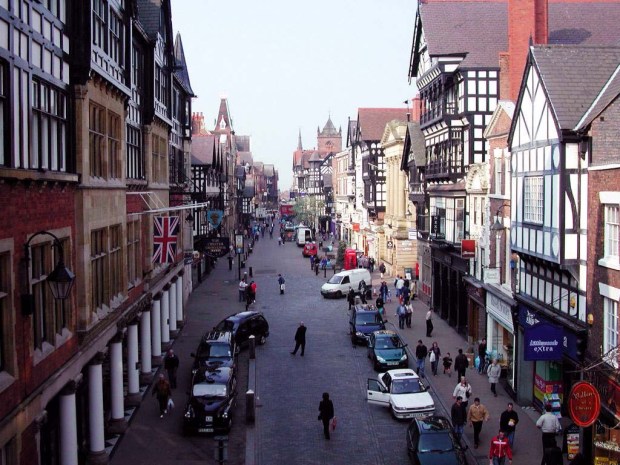9 Chester
A clipboard makes a difference. 80% of married people, when approached by strangers, admit to having committed adultery. Hanky panky complicated lives. Now the mobile phone makes it impossible. Chester helped the hanky pankiers of Liverpool. Scouse women joked that if a man took you to Chester he was married.
Married couples not tempted by hanky panky, and married couples that are, take their kids to the Zoo. Chester Zoo had 1.7 million visitors last year. Although the zoo is enclosed by a perimeter fence, within the zoo moats and ditches are used instead of cages.
Chester is close to the Welsh border. Before Liverpool became fashionable some folk from Chester would claim to be Welsh. Famous Liverpool now provides an optional identity. Chester has 328,100 residents. Those not sniffy about extra marital sex enthusiasts can enjoy a walk beside the River Dee. The riverside café that had a rock and roll jukebox has disappeared. Rock and roll cafes perish as quickly as sideburns.
The City began as a Roman fort in AD 79. Four streets define Chester and they follow the compass, Northgate and so on. Bridge Street has tourist appeal but the Tudor buildings are fake Victorian restoration. The city walls of the original Roman fort were extended by the Saxons.
Chester produced the footballer Michael Owen. Much more entertaining was Chester born Basil Radford, the great British actor who impressed in the Hitchcock classic, The Lady Vanishes. Chester was also the last town to resist the Normans. Such resistance helped define the North of England. Prior to that, in 616, the Northumbrian Army defeated Welsh Bishops in the Battle of Chester. It does not sound like a fair fight.
135 bikes were stolen last year in Chester. The same statistics indicate that you are four times more likely to be thumped. The Alexander pub offers jazz, blues and comedy, just the thing before extra marital sex or a fistfight.
Chester was a market town, its economic strength solidified by the Industrial Revolution. Chester has a busy rail station. The Shropshire Canal enters the city. A good urban walk combines the Canal and the city walls.
The suburb of Blacon was expanded as a response to the housing shortage of the 60s. More mixed than the stereotype suggests, many living in Blacon are ‘socially vulnerable’. Presumably to save on travel expenses, Cheshire Constabulary built its headquarters there. Today, Chester has a prosperous middle class managing a large retail market facilitated by industrial activity elsewhere. The City Plan notes that the city ‘has rested on it historic laurels’. The City Council is alarmed by the high number of poorly educated locals with low qualifications. Welcome to the neo-liberal future of the UK whose balance of trade deficit will have similar consequences. Gloom aside; unemployment in Cheshire is below 3%. In the North West it is 10.5% and in the UK 15%.
The Duke of Westminster owns land within Chester and receives substantial rent. Not especially articulate, and despite his protection racket, the family name, Grosvenor, appears across the City. The Grosvenor Shopping Centre is an exceptional arcade with a classy rococo terrace and ceiling that captures light.
Next week, UKIP horror story – Clacton
Howard Jackson has had three books published by Red Rattle Books. His 11,000 mile journey around Brazil is described in Innocent Mosquitoes. His next book is a compilation of horror stories and is called Nightmares Ahead. It will be available in Spring 2015.
If you want to read more about his travels click here.
